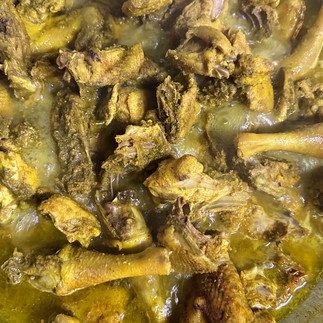Meat in Malaysia: More Than Just What's on the Plate 🍛
- Ezlyna
- May 28, 2025
- 3 min read
When living in Malaysia, food is not just a daily necessity. It is a way of life, a celebration, and often a story passed down through generations. For expats discovering Malaysian culture, understanding how different types of meat are used can lead to a much deeper appreciation of local traditions, especially during festive seasons.
Chicken: The All-Rounder
Chicken is the most commonly used meat in Malaysian cooking. It is affordable, versatile, and widely accepted across all major communities. You will find it in daily meals like curry chicken, fried chicken, soups, and grilled dishes.
During Hari Raya Aidilfitri, popular dishes include ayam masak merah, kurma ayam, or chicken served with nasi minyak. These dishes are rich, aromatic, and made to be shared.
Some chicken dishes like ayam percik, a grilled chicken coated in coconut-spice gravy, are more often found at pasar malam or Ramadan bazaars than on a Raya table. Still, every family has their own take, and it might appear on a festive menu depending on tradition or region.
Beef: Rich, Festive and Deeply Cultural
Beef is often associated with special occasions in Malaysia. It features heavily in Malay and Indian cooking, with one of the most iconic dishes being rendang. This slow-cooked dry curry is full of deep, complex flavours and is a centrepiece dish during Hari Raya and large family events.
Other beloved beef dishes include daging masak hitam, sup tulang, and soto daging. While beef is less common in some Chinese Malaysian households due to cultural preferences, it remains widely available and well loved across the country.
Goat and Mutton: For Special Guests
Goat and mutton are usually saved for festive or formal occasions. Dishes like kari kambing and kambing bakar are rich, hearty, and full of flavour. You will often find them at weddings, family gatherings, and festive celebrations.
During Hari Raya Haji, goat or cow meat is distributed among families and neighbours as part of the qurban tradition. This is a beautiful example of how food in Malaysia is tied not only to culture, but also to faith, charity, and community.
Pork: Culturally Specific
Pork is widely eaten by Chinese Malaysians and other non-Muslim communities in Malaysia but is strictly avoided by Muslims. Signature dishes include char siu, siew yuk, and bak kut teh, a herbal soup with pork ribs.
Restaurants that serve pork are usually clearly marked as non-halal, and in public or mixed community settings, pork is typically not served out of respect for Malaysia’s diverse population.
Seafood and Plant-Based Options
Although not classified as meat, fish, prawns, squid, and tofu are essential in Malaysian cuisine. From asam pedas ikan pari to udang masak lemak, seafood dishes are often the highlight of the meal and are especially common in coastal regions.
Vegetarian dishes are also popular and easy to find, particularly in Indian and Chinese restaurants. These options provide a good alternative for those with dietary restrictions or who prefer lighter meals.
Helpful Notes for Expats
The word “daging” usually means beef unless otherwise stated.When attending events or hosting guests, checking if meals are halal is a thoughtful gesture.Festival open houses often include meat-rich menus, and it is completely fine to ask what is being served. Vegetarian and seafood options are widely available and respected across communities.
In Malaysia, meat is more than just a source of nourishment. It reflects culture, family traditions, and the joy of coming together. Whether it is rendang at a Raya feast, satay at a night market, or daging salai at a wedding table, these dishes tell stories of heritage and hospitality.
For expats, exploring meat in Malaysian cuisine is a meaningful way to connect with the local culture. Every bite brings you a little closer to the people, their warmth, and the heart of the Malaysian table.
Curious about where to shop for halal meat or keen to try cooking these dishes yourself? Malaysian Link is here to help you live, eat, and explore like a local.
📷: Hapiz Rosli









Comments